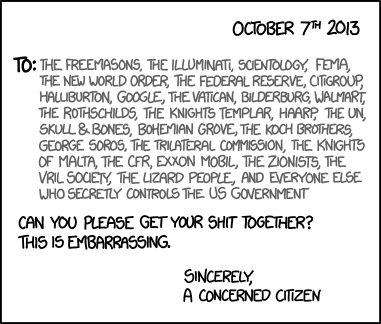“Quantitative economics can get us part of the way towards understanding the world, but if we want to truly understand what sorts of work are socially valuable, we have to be comfortable thinking qualitatively about how individual jobs work, why they exist, and what social value they create.” — Harold Lee on The Future Primaeval
Tag: economics
This website was archived on July 21, 2019. It is frozen in time on that date.
Sonya Mann's active website is Sonya, Supposedly.
Politiblah Economiblah
I have simple political ideas, and they are mostly economic. Over the past year I’ve started to think of myself as anti-capitalist but pro-market and mostly in favor of free trade. I might be a “bleeding heart libertarian” as described on Slate Star Codex.
When I wrote about human rights not being innate, I said:
“Personally, I want a government that is obliged to provide healthcare to everyone, housing to anyone who asks for it, education to anyone who wants it, and asylum to anyone who seeks it. […] I want a government that runs its own prisons entirely with public money, and runs a lot less of them.”
Expanding on that: I think we need a strong social safety net. To be more explicit, I want the government to tax people progressively — a scheme in which the rich give more than the poor, proportionally — and use the revenue to fund universal healthcare and an inversely graduated basic income. (The United States has implemented a stunted version of this progressive taxation and welfare system.)

I find anarchism and pure libertarianism ideologically appealing, but ultimately they are both fantasies that depend on people behaving in ways that people fundamentally don’t and won’t. We have developed the government we have for a reason, and making fundamental changes is extremely difficult. I like systems that depend on everyone’s self-interest — it is the only reliable motivator. (This is why markets work so well!)
All of this is half-formed. Until I feel more solid in my convictions, it’s comforting to adopt a kind of economic fatalism. Technology seems to drive most economic cycles, and demographics seem to drive most political cycles… I need to keep grappling with these thoughts.
Fiddler on the Roof & American Conservatism
Disclaimer: blatant liberal bias ahead + this post won’t make sense if you’re not familiar with Fiddler on the Roof.

I grew up listening to songs from Fiddler on the Roof, so the music and lyrics are firmly ingrained in my brain. But I didn’t grok the political implications until after 1) watching the movie, 2) learning more about history, and 3) observing human power relations. Just as an example, my childhood interpretation of “To Life” didn’t incorporate longstanding Russian antisemitism. I had no concept of how radical it was for Russian soldiers and Jewish peasants to dance together.
In the very beginning of Fiddler on the Roof, Tevye addresses the audience:
“A fiddler on the roof. Sounds crazy, no? But in our little village of Anatevka, you might say every one of us is a fiddler on the roof, trying to scratch out a pleasant, simple tune without breaking his neck. It isn’t easy. You may ask, why do we stay up there if it’s so dangerous? We stay because Anatevka is our home. And how do we keep our balance? That I can tell you in one word: tradition.”
Doesn’t that sound pretty damn parallel to the segment of America without white-collar skills, the segment increasingly devastated by technological progress? From what I hear, the Rust Belt hasn’t picked up much since heavy industry and manufacturing emigrated.
Go ahead and imagine it. You can’t get a job, or maybe you can only get a crappy job. The government is full of elites whose priorities diverge from yours. (This is where the analogy to Fiddler on the Roof breaks down, since obviously the Russian czar was genuinely oppressive. Which is not to say that the American government isn’t genuinely oppressive, but it targets different demographics.)
Amidst this uncertainty, you cling to your traditions, because that’s all that remains from the days of relative prosperity. That includes intellectual traditions (also explored in Fiddler on the Roof). So any deviation from antiquated Christian biblical-ish morality is perceived as a threat.
As usual when writing about politics, I’m going to link to Scott Alexander’s brilliant essay “I Can Tolerate Anything Except The Outgroup” and call it a day.
“And if our good fortune never comes, here’s to whatever comes! Drink, l’chaim, to life!”
Middlemen Are Crucial: Open-Source Software & Economic Growth
Disclaimer: I’m open to disagreement that is expressed respectfully. If you have an argument against my interpretation, please share it. (Of course, I can’t guarantee that I’ll agree with your critique.)
I want to elaborate on a conversation about the economics of code from Hacker News. User wrong_variable said:
“Programmers get no respect — and its our own fault.
The computing industry is directly responsible for 1/3 of global GDP in 2016.
Its time that this is reflected in our paycheck.”
Leaving aside the assertion that programmers aren’t paid well, I responded:
“Keep in mind that code is not useful or economically impactful without business and community management surrounding it.”
User overgard chimed in:
“I think that’s demonstrably untrue — open source and free software has had a massive economic and cultural impact with precious little of that originating from the involvement of business people or community leaders. (For instance, the GNU project or the linux kernel — not to mention how many commercial products must use zlib). Business support almost always comes after the value has been created.”
I disagree. There are two threads here that I want to tease out:
- Writing and testing code on the scale of a project like Linux or Ruby requires a community. Some people in the community, even if they are adept programmers, will be needed to support the project in other ways.
- Once a program / framework / whatever is ready, it can’t promote economic growth unless it’s deployed by a business. In other words, software for its own sake is economically pointless. (By the same principle, outside of the open-source world, managers, salespeople, and marketers exist for a reason.)
People who make things tend to underestimate the importance of middlemen. I mean “middlemen” broadly — anyone in between production and consumption. In this case, programmers are production and regular end-users are consumption. However, before any product can be consumed, you need distribution.

Prior to the internet, distribution was limited by physical location and thus geographically specific. Particular companies controlled particular regions; they maintained relationships with individual stores. On the internet this dynamic is fundamentally different because the cost of distribution is negligible. Digital goods are effectively free to replicate, meaning there is no marginal cost. (Ben Thompson’s “Aggregation Theory” describes the consequences: value comes from being the layer that users interact with, which compels suppliers or advertisers to use your platform.)
When it comes to software, distribution is simple but difficult. It consists of two crucial functions:
- Making people aware of the software’s existence.
- Convincing them to use it by providing a compelling value proposition.
For the most part, those things don’t happen spontaneously. You need evangelists (as much as I hate that word). And those evangelists need incentives. The creators and proponents of open-source software are usually not paid directly for their labor (there are exceptions) but they are rewarded with social capital that can be leveraged into professional remuneration. You need people to write documentation and blog posts, organize / host meetups, and generally nurture the project’s ecosystem. This is the “community” part of the “business and community management” that I cited as being vital.
Even more saliently, free and open-source software projects only have an economic impact when businesses exploit comparative advantage by using them. For example, Super Body Fuel’s online store was made with WooCommerce, which sits on top of WordPress. The owners didn’t have to hire a developer to build a site for them. Using PayPal [1] as their payment processor also lowered the up-front cost and hassle.
Because of this, businesses like Super Body Fuel need less capital to get started. The owners can spend more time focusing on factors that differentiate their business (in SBF’s case, formulating a healthier and less expensive competitor to Soylent). In terms of investment and payoff, growing their business is a higher-return activity than setting it up in the first place. Efficiency increases, which result from technological innovation, are the only impetus of non-zero-sum economic activity. In a word, growth.
Of course, none of this could happen if the Super Body Fuel owners didn’t know about WordPress and WooCommerce, or if they didn’t have access to the intermediary tools necessarily to deploy them. Some amount of information seeps around without anyone making an effort, but awareness and resources that will reach thousands of people almost always require intentional promotion. Thus, coding is not enough to propel the open-source world. Other types of labor are needed to keep attracting more contributors and users.
[1] Like every large software company, PayPal both uses and develops OSS. For example: OpenStack and Linux.
Simple Versus Easy
Simple things consist of a limited number of intuitively understandable elements. Easy things are, well, easy — they don’t require a lot of effort or education. There is plenty of crossover, but “simple” and “easy” are not the same.

For example, working retail at Walmart is simple. Almost anyone can do it, which is why it’s a low-paid job — there’s no supply constrain of potential employees to drive up the price. (Side note: price =/= value.) However, working retail at Walmart is a hard job. Being in contact with customers all day is emotionally exhausting, especially when you work for an exploitative company that doesn’t mind employee burnout.
It’s not the worst thing in the world when “simple” and “easy” are conflated, but it’s useful to remember why we have two different words and two different underlying ideas. There are plenty of simple tasks that are expensive because they’re difficult to execute.
I considered making this a longer post, but really, there’s no need. It’s a simple thought, after all ;)
Sign up for my newsletter to stay abreast of my new writing and projects.
I am a member of the Amazon Associates program. If you click on an Amazon link from this site and subsequently buy something, I may receive a small commission (at no cost to you).